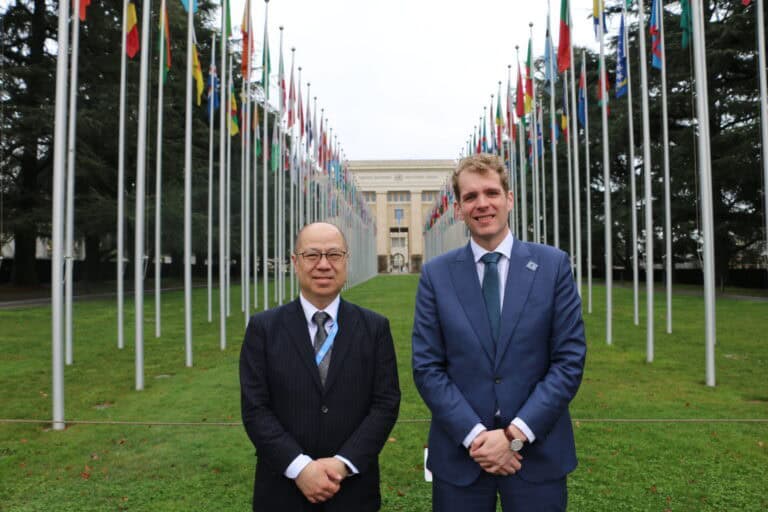The European Union of the Deaf (EUD) took part in the United Nations Committee on the Rights of Persons with Disabilities’ (CRPD Committee) public review of the European Union on 11 and 12 March 2025 in Geneva. Represented by EUD Policy Manager Alexandre Bloxs, EUD formed part of the delegation of organisations of persons with disabilities (OPDs), contributing actively to the discussions and ensuring that the rights of deaf people are featureds in the debates and Concluding Observations.
The CRPD Committee reviewed the implementation of the Convention on the Rights of Persons with Disabilities (CRPD) by the EU since its last review in 2015. The constructive dialogue offered the Committee an opportunity to raise critical questions on the situation of persons with disabilities within the EU, including deaf people. Given the limited time allocated to us to raise our issues with the members of the CRPD Committee, we decided to strategically focus on two major issues to the European deaf community: the official recognition of the 29 EU national sign languages, and the accessibility of the EU-wide emergency number 112 for National Sign Language users.
Recognition of the 29 National Sign Languages as EU Official Languages
On the second day of the dialogue, Committee Member Laverne Jacobs asked whether the EU intends to include the 29 national sign languages in the list of official EU languages under Regulation 1/1958. In response, the EU delegation asserted that access to national sign languages remains the responsibility of Member States. They pointed to EU-level initiatives such as the European Accessibility Act, sign language-related research projects, and CERV funding granted to EUD.
Committee Member Hiroshi Tamon followed up, specifically addressing the issue of language-based discrimination under Article 21 of the EU Charter of Fundamental Rights. He asked whether the EU would tackle such discrimination by officialising the 29 national sign languages. However, the EU delegation replied that Article 21 does not have a direct effect on EU institutions and instead applies to Member States.
EUD is concerned by the European Commission’s approach, which continues to frame the issue solely under the scope of accessibility (Article 9 CRPD), rather than recognising it as a question of linguistic rights and freedom of expression under Article 21 CRPD. The Committee’s questions clearly targeted the need for official recognition of National Sign Languages at the EU level—not merely access or promotion. EUD will continue to advocate for the inclusion of all 29 EU national sign languages as official languages of the European Union to ensure equal status and protection of the linguistic rights of deaf citizens.
Accessibility of the European Emergency Number 112
On the first day, Committee Member Hiroshi Tamon questioned the EU delegation on how it plans to guarantee full accessibility of the 112 emergency number for deaf sign language users within the framework of the European Accessibility Act, and whether these measures will be developed in close consultation with organisations representing deaf people. In addition, Committee Member Laverne Jacobs raised concerns about the decision to allow Member States to delay implementation until June 2027, and asked what safeguards would be in place in the interim.
The EU delegation cited European Standardisation Mandate 587, which mandates the development of harmonised standards for emergency communication systems. However, no specific response was provided on how these standards would ensure accessibility for deaf users or involve the input of deaf-led organisations.
EUD remains seriously concerned about the timeline, with the expected publication of the new standards in January 2027—only months before the legal implementation deadline. This delay poses a direct threat to the safety of deaf people and their families, particularly in the absence of interim solutions. EUD strongly urges the EU to require all Member States to provide accessible emergency services via Total Conversation and in National Sign Languages on a 24/7 basis, without further delay.
Broader Contributions and Way Forward
EUD also welcomes the CRPD Committee’s attention to other cross-cutting issues raised in our parallel report, including political participation, access to information and sexual and reproductive health services, disaggregated data collection, and freedom of movement within the EU.
We look forward to the Committee’s Concluding Observations, expected by early April 2025, and will continue engaging closely with the European Commission to support their implementation.
EUD appreciates the efforts made by EU institutions over recent years in partnership with organisations of persons with disabilities. However, much more must be done to uphold the sign language rights of deaf people across the EU. We urge the European Commission to take immediate and decisive action on the two key issues raised by the CRPD Committee—National Sign Language recognition and accessibility of the 112 emergency service—on behalf of over one million deaf EU citizens.












